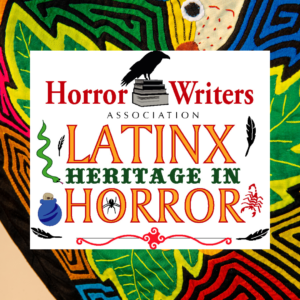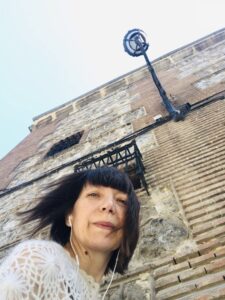Latinx Heritage in Horror: Interview with Rosemary Thorne

 Rosemary Thorne (she/her) is a bilingual Spanish writer, researcher, and translator living in Madrid, Spain. She was born in 1968, year of shocking revolutions, beautiful women and great wine. Due to the fact that in the 90s Spanish publishing companies would not consider Horror, her first stories in her mother tongue are abominable entities that want to terrify but can’t. Her first novel, El Pacto de las 12 uvas, took her twenty years to finish, and she finally published it in December 2021. In 2019 she became an HWA member and began to write horror in English, setting free her imagination at long last. She translated Edward Lee’s The Bighead into Spanish for Dimensiones Ocultas Press. Her immediate dream is to populate the English market with her dreadful monsters and then not to write anymore.
Rosemary Thorne (she/her) is a bilingual Spanish writer, researcher, and translator living in Madrid, Spain. She was born in 1968, year of shocking revolutions, beautiful women and great wine. Due to the fact that in the 90s Spanish publishing companies would not consider Horror, her first stories in her mother tongue are abominable entities that want to terrify but can’t. Her first novel, El Pacto de las 12 uvas, took her twenty years to finish, and she finally published it in December 2021. In 2019 she became an HWA member and began to write horror in English, setting free her imagination at long last. She translated Edward Lee’s The Bighead into Spanish for Dimensiones Ocultas Press. Her immediate dream is to populate the English market with her dreadful monsters and then not to write anymore.
Find out more at: linktr.ee/Rosemary_thorne and Twitter at twitter.com/rosemarythorne
What inspired you to start writing?
I can’t remember myself not writing. There is a picture of four-year-old me, pen in hand, looking at the camera and thinking, “I am a writer.” I’ve written my entire life. It has been such a relentless passion that at 54 my current goal is to “stop writing.” I don’t mean with this not typing words on a laptop or scribbling on a piece of paper: I want to stop writing in my head. Go Nirvana and totally wordless. To conquest silence and the skin of being alive. I still have to get out a couple of stories that would ensure “my heritage”.Then, afterward, my dream: “no writer no more.”
What was it about the horror genre that drew you to it?
I was drawn to Horror because my home was hell, I have an abusive narcissistic mother. One way to cope with it was to pay attention to what other people were scared of, observing the composition of fear, and how they would endure it and overcome it. That’s why I think horror books, movies and workshops should be accessible to children: it will help them cope with unmanageable situations. I began watching horror movies on TV, which was easier than finding books at that time. After Franco died, Spain underwent a political, social and cultural transition. In the 90s we reached a minimum balance with the rest of the world, but it hasn’t been until this last decade that horror books have become common, so to speak.
In regards to writing, if you were a woman with literary ambition in Spain, you had to be Simone de Beauvoir. Having Shirley Jackson as a reference was out of the question. Pilar Pedraza, for instance, a Spanish horror writer of an older generation than mine, is not as recognized as she should because she writes Horror. I’ve spent my entire life dressing up my short stories as if I were Julio Cortázar or Jorge Luis Borges. Their stories might induce some levels of fear, but do not belong to the horror genre, that’s my opinion. I openly began writing horror in 2019, being 51 years old, when I became an HWA member.
Do you make a conscious effort to include LatinX characters and themes in your writing and if so, what do you want to portray?
In my second novel, “El pacto de las 12 uvas”, I wanted the three protagonists to be Spanish, in contrast with the rest of the characters, who are an homage to traditions of evil worldwide. It gave me great joy to describe Satan strolling around Madrid, the city I grew up. As per my short stories, I reckon their identity is confusing. I write in English, but my characters are between worlds: they can’t be too local because English readers will miss nuances, but they aren’t English locals either. Where to locate them? It is challenging for me to create characters English readers can relate to because I am not a LatinX living in the States, but in Madrid. Nevertheless, I always include a little detail to warn the reader that I am a LatinX writer, thus asking them to meet me halfway.
What has writing horror taught you about the world and yourself?
I’ve come to believe that Horror is the only genre that talks about the truths in life, uncovering the lies we build our lives around. Horror is for the brave, for all those who overcome their fears and keep walking a meaningless existence. I’ve turned it into my fortress, all my philosophy, and what my life is about. There’s a lovely scene in “A serious man,” a movie by the Cohen brothers. The wisest rabbi poses the following question: “When the truth is found to be lies and all the hope within you dies, then what?” The answer to that, I believe, is the last page of every horror book ever written.
How have you seen the horror genre change over the years? And how do you think it will continue to evolve?
In Spain, it has changed a lot. During Franco’s dictatorship, it was forbidden. It could not thrive as a genre. Authors that were natural horror storytellers endured insanity. I am specifically thinking of Leopoldo María Panero, a fan of the English horror tradition, who enclosed himself in the toughest circle of dark poetry, spending the last years of his life in a psychiatric hospital. Spain needs more time to develop our own brand of Horror. Publishing companies are being audacious, risking everything to build a solid readership. First, we read, train our imagination to capture the fears of our own peninsula, and then we create our own Horror. For now we just import it: it’s more convenient and profitable.
In regards to the genre in the English markets, it’s Party Time! A new Golden Age, with authors of all kinds, characters, and readers following diversity and inclusiveness criteria. Seeing it thriving so free and outspoken is excellent. I could add that the English markets could be more open to foreign horror voices, but that would be unfair for me to say because despite of being small game, I am publishing, my submissions are being accepted. Meaning, the English market will welcome you and have you without discrimination of any kind if you are there, if you fight for your voice.
How do you feel the LatinX community has been represented thus far in the genre and what hopes do you have for representation in the genre going forward?
I see LatinX authors succeeding in the States and it truly makes me happy! On the one hand the horror LatinX writing community has worked really hard for it, and on the other hand the HWA has really contributed to this reality. The presence of LatinX Horror in mainstream media will increase, of course: it is a force that can’t be stopped, as it happens with other collectives of race and gender and other collectives discriminated until now.
Who are some of your favorite LatinX characters in Horror?
All the characters in “Pedro Páramo,” by Mexican writer Juan Rulfo. I was also very impressed by the works of Miguel Ángel Asturias, and other authors from Haiti, Brazil, Peru. They were not specifically “horror” writers but created what is called “magic realism,” popular thanks to Gabriel García Marquez’s “One hundred years of solitude.” I’ve also studied Carlos Castaneda, and his “Don Genaro,” with his nonsensical dances and surreal appearances, can be terrifying. Doña Soledad, however, is entirely another matter. She is the almighty witch! One of the chapters of my novel “El Pacto de las 12 uvas” is a homage to Popol Vuh, one of my favorite readings. You see? I had to cross the ocean to find these kinds of texts. It is not that in Spain we don’t have magic realism; we forbid ourselves to “develop” it. We are in the south of Europe, the north of Africa, and the west of the Mediterranean Sea with no horror or magical traditions. How can that be possible?
Who are some LatinX horror authors you recommend our audience check out?
My three heroes: Cina Pelayo, Violet Castro and Gabino Iglesias. I’ve followed them for the last year, and they’ve made it, they are so professional and truthful. I know that other LatinX bros and sis are fighting very hard to reach the markets, but hadn’t it been for Cina, Violet, and Gabino, I don’t think it would have been possible for the rest of us. I thank them for their hard work, for giving us their strength and their version of terror.
What is one piece of advice you would give horror authors today?
To horror authors who have reached a level of notoriety, please volunteer in the HWA mentor program! We need you! Please share your knowledge with us beginners!
To the rest, be yourselves and write your own brand of horror. Being oneself and knowing who one is takes time and courage, but I think that’s the essence of life. Even if it feels lonely and very risky, do your own thing and leave a truthful record of yourself.
And to the LatinX writers out there who are just getting started, what advice would you give them?
Submitting to magazines and anthologies is a wonderful way to build one’s voice, and to slowly find your readership. Be ready to be rejected time and again. It doesn’t matter. The HWA Discord has a channel for “Rejections”: I wait for you there. Share your rejections with us, and keep submitting until acceptances increase in number. Overall, do not give up: even if solitude, madness, and misery might feel too close at times, do not give up. It comes a moment when the stars ally and your voice begins to make sense in other people’s imagination. Wait for it. It comes and goes, like stars breathing. Join that dance and overcome your terrors.



